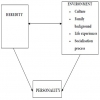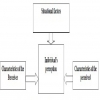Home | ARTS | Management Concepts & Organisational Behaviour
|
Meaning and Definition of Personality - Personality And Individual Differences
Management Concepts & Organisational Behaviour - Personality And Individual Differences
Meaning and Definition of Personality - Personality And Individual Differences
Posted On :
Personality is a complex phenomenon and difficult understand. There is no single universally acceptable definition.
Meaning and Definition of
Personality
Personality is a complex phenomenon and difficult understand. There is no single universally acceptable definition. Personality refers to the personal characteristics that lead to consistent patterns of behaviour. It represents the overall profile or combination of stable characteristics that capture the unique nature of a person. Personality combines a set of physical and mental characteristics that reflect how a person looks, thinks, acts and feels. It has both internal and external elements. External traits are observable behaviours on the basis of which we can understand one’s personality. The internal factors are thoughts, values and genetic characteristics that are inferred from the observable behaviours. According to Hogan, personality refers to the relatively stable pattern of behaviours and consistent internal states that explain a person’s behavioural tendencies.
We can understand from the above
definition that people have some traits in common with others and some uncommon
with them. Each employee in an organization is unique and he may or may not act
similarly in a similar situation. Therefore, managers cannot use the same kind
of rewards or motivation techniques to influence employee’s behaviour. The
above definition does not mean that people do not ever change. It simply
indicates that individuals do not change drastically overnight and their
thoughts, feelings, values, and actions remain relatively stable over time.
Personality changes in individuals occur slowly over an extended period of
time. However, an understanding of personality dimensions would enable managers
to predict the behaviour of employees and manage them effectively.
Personality is a complex phenomenon and difficult understand. There is no single universally acceptable definition. Personality refers to the personal characteristics that lead to consistent patterns of behaviour. It represents the overall profile or combination of stable characteristics that capture the unique nature of a person. Personality combines a set of physical and mental characteristics that reflect how a person looks, thinks, acts and feels. It has both internal and external elements. External traits are observable behaviours on the basis of which we can understand one’s personality. The internal factors are thoughts, values and genetic characteristics that are inferred from the observable behaviours. According to Hogan, personality refers to the relatively stable pattern of behaviours and consistent internal states that explain a person’s behavioural tendencies.
Tags : Management Concepts & Organisational Behaviour - Personality And Individual Differences
Last 30 days 838 views














